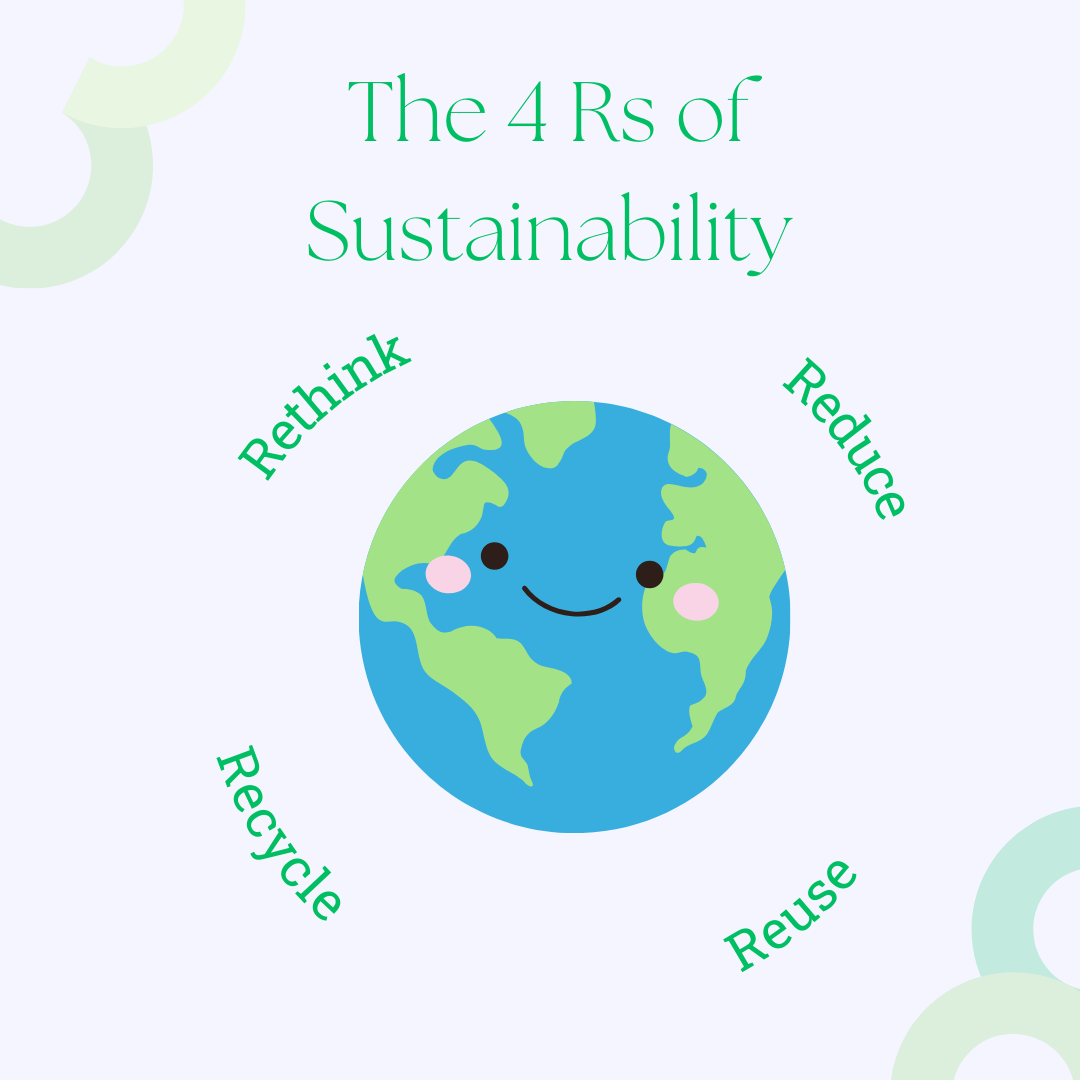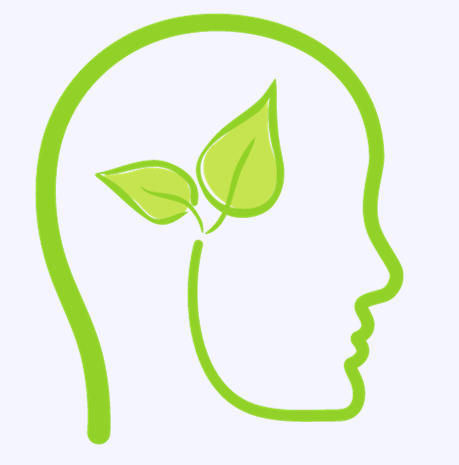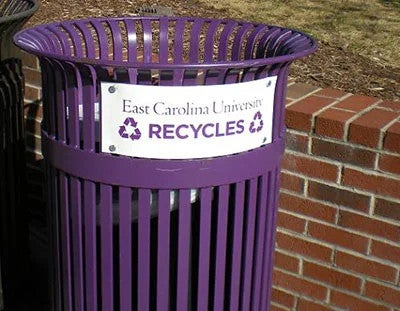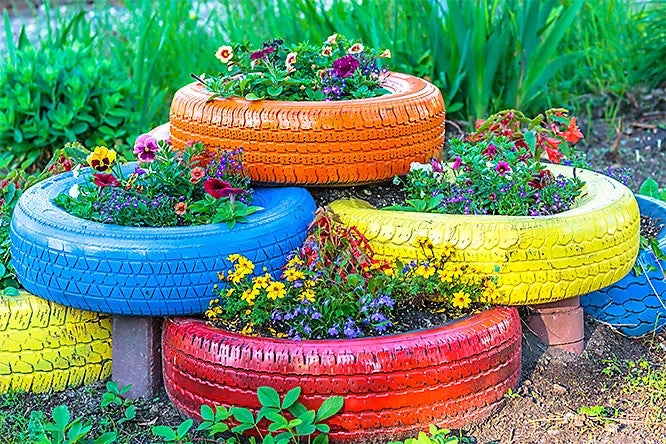Green New Year’s Resolutions
Living sustainably is something that we must continuously recommit to. Between being surrounded by advertisements for products that are usually not very sustainable, updates to information, science, and technology that change what our view of sustainability is and how we interact with the environment, and the human tendency to sometimes forget or go back to old habits, sometimes we just need to take a moment to reflect on what we’re doing and why. The beginning of a new year is already a time when people tend to reflect on how the past year went and what their goals going forward look like, so why not include sustainability with some green New Year’s resolutions?
The 4 R’s
“The 4 Rs” is a common term used in sustainability, each “R” representing a way to be more sustainable: Rethink, Reduce, Reuse, Recycle. These words are listed in order of priority for the movement with “Rethink” being the idea we put the most emphasis on and “Recycle” being the last resort as it puts more pressure on an outside system to handle our waste. The 4 Rs are an easy prompt to have around to remind yourself throughout the year of your sustainability goals. For instance, write them on a note to put beside your computer or use them as inspiration to make some art that you can hang in a visible space.

Rethink
We are living in a consumerist culture that ingrains a want for more stuff into us from a very early age. As a society, we need to make a shift away from this mindset of always wanting more because we are currently using more raw materials than our planet has to offer. When it comes to thinking, outside influences can have a big effect. In other words, a way to “rethink” is to look for new resources. Here are some ways you can potentially work this into some goals for 2024:
- Check out the new section of our website! It aims to help you be more sustainable at home so you can stay involved with sustainability whether you’re on campus at ECU, going home for the day, or want to give tips to friends off campus.
- Consider who you follow on social media. Is it fashion influencers who regularly have giant hauls from fast fashion companies? Is it pranksters who waste resources to embarrass strangers? Or is it people who speak about sustainability and embrace environmentalism? The people we choose to watch and entertain us can have a huge influence on our thinking in everyday life.
- Pick up a new book! Whether it’s non-fiction like The Story of Stuff by Annie Leonard or something fictional like The Ministry for the Future by Kim Stanley Robinson, seeking out material that can get you into the right mindset for a sustainable 2024 can help you stay informed and get you excited. Not up for reading because of time constraints or attention issues? Try the audiobooks!
- Think about everyday institutions and actions you take. What industries are you supporting with each purchase? What does your money go towards in the bank? Plan your purchases in advance so you can shop around at thrift stores, local small businesses, or sustainable brands instead of instantly resorting to big box stores.

Reduce
This is one aspect that many people think of when they think of sustainable living. They often expect environmentalists to be minimalists as well as reduce their use of resources like water and energy. While reduction overall is a great goal, working a little at a time on reducing specific things can help you reduce your environmental impact more efficiently.
- Reduce the use of single-use plastics in your life! Whether it’s the disposable cup from your favorite coffee shop or cheap plastic utensils from an event, you can avoid wasting these by having your own reusables handy!
- Reduce the number of animal products you consume. The vast majority of greenhouse gases from the foods we eat come from animal agriculture. Consider choosing a day or two out of the week to try out vegan and vegetarian options.
- Reduce buying new things. Every new product we purchase takes raw materials to make and often the acquisition of those materials as well as the creation is harmful both to the planet and to people. Buying used allows you to avoid this and a chance to find some unique items.
Reuse
Reusing items can be as simple or as creative as you want it to be. If you don’t mind having a jar with a tomato sauce label to keep cooking utensils in, you don’t need to do anything beyond washing the jar. If you want to do a full revamp and upcycle to remove the label and decorate the jar, that’s a great way to reuse it as well!
- Look for ways to upcycle items that are often considered “trash” like cardboard boxes.
- Mend clothing and other items before trashing them to buy something new. If you don’t know how then you can pick up a new skill as well as embracing sustainability! There are some wonderful tutorials for skills like this on YouTube.
- Get creative with how you think of things. Don’t just look at what they are, but consider their components and what they can become.
- Stained, ripped, or otherwise unwearable clothing can be made into cleaning cloths
- Packing paper can be decorated and made into wrapping paper for gifts
- Use old, cracked mugs as planters or pencil holders
Recycle
The most important part when it comes to recycling is knowing how to do it correctly. This varies based on where you live and what local recycling centers accept. If you live near ECU, be sure to check out our new page dedicated to waste information.
- Some general tips that most recycling centers have are to make sure any containers you recycle are cleaned out, just because it has a recycle sign on it doesn’t mean it can be recycled where you are, and if there is food or oil residue on paper products, it probably can’t be recycled.
- For items that can’t be recycled in your area, look into businesses that sell them. For instance, Staples recycles things like batteries, writing tools, and printer cartridges.

Other Ideas
- Get involved! ECU Sustainability hosts several events throughout the semester including three different monthly service opportunities. Keep an eye on our social media for information about upcoming events with us and our student groups!
- Share your knowledge and ideas with others. Whether it’s chatting with friends, writing a blog, or updating your TikTok, spreading the word about sustainability is a great way to connect with others and maybe learn something new yourself.
- Remember that the goal isn’t perfection, but growth!
If you have some sustainable resolutions or goals for the year, we’d love to hear about them! Post about it on your social media and tag us.

